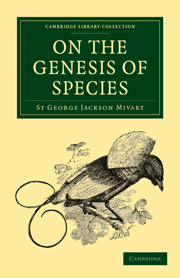Book contents
- Frontmatter
- Contents
- LIST OF ILLUSTRATIONS
- CHAPTER I INTRODUCTORY
- CHAPTER II THE INCOMPETENCY OF “NATURAL SELECTION” TO ACCOUNT FOR THE INCIPIENT STAGES OF USEFUL STRUCTURES
- CHAPTER III THE CO-EXISTENCE OF CLOSELY SIMILAR STRUCTURES OF DIVERSE ORIGIN
- CHAPTER IV MINUTE AND GRADUAL MODIFICATIONS
- CHAPTER V AS TO SPECIFIC STABILITY
- CHAPTER VI SPECIES AND TIME
- CHAPTER VII SPECIES AND SPACE
- CHAPTER VIII HOMOLOGIES
- CHAPTER IX EVOLUTION AND ETHICS
- CHAPTER X PANGENESIS
- CHAPTER XI SPECIFIC GENESIS
- CHAPTER XII THEOLOGY AND EVOLUTION
- INDEX
CHAPTER II - THE INCOMPETENCY OF “NATURAL SELECTION” TO ACCOUNT FOR THE INCIPIENT STAGES OF USEFUL STRUCTURES
Published online by Cambridge University Press: 29 August 2010
- Frontmatter
- Contents
- LIST OF ILLUSTRATIONS
- CHAPTER I INTRODUCTORY
- CHAPTER II THE INCOMPETENCY OF “NATURAL SELECTION” TO ACCOUNT FOR THE INCIPIENT STAGES OF USEFUL STRUCTURES
- CHAPTER III THE CO-EXISTENCE OF CLOSELY SIMILAR STRUCTURES OF DIVERSE ORIGIN
- CHAPTER IV MINUTE AND GRADUAL MODIFICATIONS
- CHAPTER V AS TO SPECIFIC STABILITY
- CHAPTER VI SPECIES AND TIME
- CHAPTER VII SPECIES AND SPACE
- CHAPTER VIII HOMOLOGIES
- CHAPTER IX EVOLUTION AND ETHICS
- CHAPTER X PANGENESIS
- CHAPTER XI SPECIFIC GENESIS
- CHAPTER XII THEOLOGY AND EVOLUTION
- INDEX
Summary
“Natural Selection,” simply and by itself, is potent to explain the maintenance or the further extension and development of favourable variations, which are at once sufficiently considerable to be useful from the first to the individual possessing them. But Natural Selection utterly fails to account for the conservation and development of the minute and rudimentary beginnings, the slight and infinitesimal commencements of structures, however useful those structures may afterwards become.
Now, it is distinctly enunciated by Mr. Darwin, that the spontaneous variations upon which his theory depends are individually slight, minute, and insensible. He says, “Slight individual differences, however, suffice for the work, and are probably the sole differences which are effective in the production of new species.” And again, after mentioning the frequent sudden appearances of domestic varieties, he speaks of “the false belief as to the similarity of natural species in this respect.” In his work on the “Origin of Species,” he also observes, “Natural Selection acts only by the preservation and accumulation of small inherited modifications.” And “Natural Selection, if it be a true principle, will banish the belief … of any great and sudden modification in their structure.” Finally, he adds, “If it could be demonstrated that any complex organ existed, which could not possibly have been formed by numerous, successive, slight modifications, my theory would absolutely break down.”
- Type
- Chapter
- Information
- On the Genesis of Species , pp. 23 - 62Publisher: Cambridge University PressPrint publication year: 2009First published in: 1871



